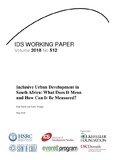Inclusive Urban Development in South Africa: What Does It Mean and How Can It Be Measured?
| dc.contributor.author | Turok, Ivan | |
| dc.contributor.author | Visagie, Justin | |
| dc.coverage.spatial | South Africa | en |
| dc.date.accessioned | 2018-05-24T08:59:52Z | |
| dc.date.available | 2018-05-24T08:59:52Z | |
| dc.date.issued | 2018-05 | |
| dc.identifier.citation | Turok, I. and Visagie, J. (2018) Inclusive Urban Development in South Africa: What Does It Mean and How Can It Be Measured?, IDS Working Paper 512, Brighton: IDS | en |
| dc.identifier.isbn | 978-1-78118-447-9 | |
| dc.identifier.issn | 2040-0209 | |
| dc.identifier.uri | https://opendocs.ids.ac.uk/opendocs/handle/20.500.12413/13770 | |
| dc.description.abstract | Inclusive development is the seductive idea that a more dynamic and productive economy can go hand in hand with reduced inequality and exclusion. This requires crafting together different values and realities, through cooperation and negotiation between different economic and social interests. This is particularly difficult in South Africa (SA) because of the deep-seated social divisions and stagnant economy. The dominant discourses emphasise either ‘growth and redistribution’ or ‘radical economic transformation’. Both are driven from above, by national government. Neither recognise the value of mobilising the energy and talents of different communities and institutions within cities and regions to engage in democratic renewal and to support joint efforts to enhance skills, build capabilities, create assets, generate jobs, and improve livelihoods. Tracking progress through carefully chosen indicators can provide timely feedback and assist learning, to ensure that bold initiatives actually work and can be scaled up to achieve greater equity while expanding economic opportunities. Cities have considerable potential to combine prosperity with social inclusion, and thereby provide pathways out of poverty – but this is not automatic or inevitable, because a flourishing urban economy can also squeeze out the poor through the housing market. Proactive policies are required to manage the process of urban land and property development in ways that accommodate in-migrants and prevent social exclusion. A positive approach to investment in marginalised groups and communities is also necessary, so that they can develop and prosper over time, and reciprocate through higher productivity. | en |
| dc.description.sponsorship | Rockefeller Foundation | en |
| dc.language.iso | en | en |
| dc.publisher | IDS | en |
| dc.relation.ispartofseries | IDS Working Paper;512 | |
| dc.rights | This is an Open Access paper distributed under the terms of the Creative Commons Attribution Non Commercial 4.0 International licence, which permits downloading and sharing provided the original authors and source are credited – but the work is not used for commercial purposes. http://creativecommons.org/licenses/by-nc/4.0/legalcode | en |
| dc.rights.uri | http://creativecommons.org/licenses/by-nc/4.0/ | en |
| dc.subject | Development Policy | en |
| dc.subject | Migration | en |
| dc.title | Inclusive Urban Development in South Africa: What Does It Mean and How Can It Be Measured? | en |
| dc.type | IDS Working Paper | en |
| dc.rights.holder | IDS | en |
| dc.identifier.team | Cities | en |
| rioxxterms.funder | Default funder | en |
| rioxxterms.identifier.project | Default project | en |
| rioxxterms.version | VoR | en |
| rioxxterms.funder.project | 9ce4e4dc-26e9-4d78-96e9-15e4dcac0642 | en |
Files in this item
This item appears in the following Collection(s)
-
IDS Research [1671]
Except where otherwise noted, this item's license is described as This is an Open Access paper distributed under the terms of the Creative Commons Attribution Non Commercial 4.0
International licence, which permits downloading and sharing provided the original authors and source are credited – but the work is not used for commercial purposes. http://creativecommons.org/licenses/by-nc/4.0/legalcode


